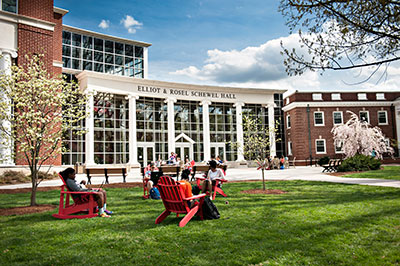 Leadership development permeates course content throughout the School of Professional and Applied Sciences and is integrated throughout the fabric of the student experience.
Leadership development permeates course content throughout the School of Professional and Applied Sciences and is integrated throughout the fabric of the student experience.
The School of Professional and Applied Sciences at the University of Lynchburg was recently ranked #4 in the nation by Leadership Excellence magazine for its degree programs with an emphasis on leadership development.
The mission of the School of Professional and Applied Sciences reflects our commitment to character building, an integral dimension of our leadership development program. We believe that students grow into leadership and have created curricular and co-curricular opportunities designed to foster personal growth in a way that nurture’s each student’s “inner leader.” While at Lynchburg, students participate in formal and informal activities that cultivate leadership attributes and skills.
Learning by Experience
The cornerstone of the School of Professional and Applied Sciences experience is active learning.
Through internships, client projects, structured and unstructured group work, and other forms of experiential learning, students develop confidence in themselves and grow in their abilities to handle increasingly complex leadership situations.
Computer simulations, role plays, and team building activities provide a broad range of opportunities for students to exercise leadership skills and professional judgment.
Leadership in the Curriculum
Students pursuing School of Professional and Applied Sciences’s interdisciplinary Leadership Studies minor undergo a complete personal leadership assessment to identify strengths and opportunities for improvement.
Through the analysis of real-world business case studies as well as historical examples of effective leaders, students develop an understanding of key leadership competencies and the contextual framework within which different leadership strategies are most productively employed.
Leadership principles and skills are developed across the curriculum, with special emphasis in classes such as “Leadership and the Classics,” “Ethical Dilemmas in Business and Leadership,” and “Crisis Management.”
Teaching and Learning
Under the supervision of their faculty mentor, students use the results of their personal leadership assessment to put together a personal leadership development plan that addresses opportunities for improvement.
The School of Professional and Applied Sciences provides a broad range of resources for students to draw upon as the implement their development plans, including networking opportunities with alumni and graduate students, a highly supportive faculty, and extensive online materials.
Nationally accredited by ACBSP, the drive for continuous improvement guides all of our learning and teaching activities. Through direct observation of the central role that feedback plays in SOBE’s continuous improvement process, students learn the importance of using feedback to shape their own leadership development.
Coaching and Mentoring
Small class sizes make it possible for students and faculty to get to know one another on a very personal level. In fact, according to a recent survey, more than three-quarters of our students developed a mentoring relationship with faculty members.
A student mentoring program allows freshmen to tap the wisdom and experience of older students.
Beyond the classroom, leadership development takes place through active participation in the Anderson Leadership Conference, the School of Professional and Applied Sciences Student Advisory Board, the Lynchburg Collegiate Entrepreneur’s Organization, and the Delta Sigma Pi business fraternity.
Executive-level interactions with community leaders, members of the School of Professional and Applied Sciences Board of Advisors, and lecturers in our Business Ethics Series add to the richness of the COB leadership development experience.
Through close ties with alumni, students can receive personal coaching and professional guidance.
The Results
Whether they’re leading from the top or from the middle, our graduates report back to us that they leave Lynchburg’s School of Professional and Applied Sciences with the skills, knowledge, and judgment needed to make a difference in the workplace.
Sixty percent of our recent graduates felt well-prepared to give back to their community or society and more than half did volunteer or community regularly and relatively often.
Students in the Delta Sigma Pi business fraternity and the Lynchburg Collegiate Entrepreneur’s Organization engage in a variety of community service activities.

